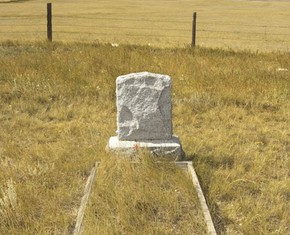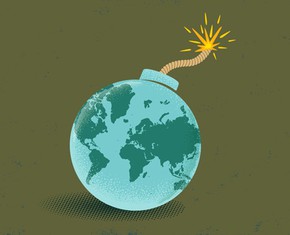The views expressed in our content reflect individual perspectives and do not represent the authoritative views of the Baha'i Faith.
Rejoice not in the things ye possess; tonight they are yours, tomorrow others will possess them. – Baha’u’llah, Gleanings from the Writings of Baha’u’llah, p. 138.
The Baha’i teachings, like the teachings of all great Faiths, ask the wealthy and the comfortable some very pointed and uncomfortable questions.
Baha’u’llah himself grew up, as the Buddha did, in a relatively prosperous family. But Baha’u’llah lost every material thing he owned after he began to proclaim the Baha’i Faith. Tortured, exiled and imprisoned, his property and his possessions stolen and pillaged, he went from relative affluence to immediate, abject poverty. He saw the polar opposites of life, the easy and the hard, and that unique vantage point contributed to these powerful questions about wealth and its ultimate consequences:
Whither are gone the learned men, the divines and potentates of old? What hath become of their discriminating views, their shrewd perceptions, their subtle insights and sage pronouncements? Where are their hidden coffers, their flaunted ornaments, their gilded couches, their rugs and cushions strewn about? Gone forever is their generation! All have perished, and, by God’s decree, naught remaineth of them but scattered dust. Exhausted is the wealth they gathered, dispersed the stores they hoarded, dissipated the treasures they concealed. Naught can now be seen but their deserted haunts, their roofless dwellings, their uprooted tree-trunks, and their faded splendour. No man of insight will let wealth distract his gaze from his ultimate objective, and no man of understanding will allow riches to withhold him from turning unto Him Who is the All-Possessing, the Most High.
Where is he who held dominion over all whereon the sun shineth, who lived extravagantly on earth, seeking out the luxuries of the world and of all that hath been created upon it? … Where are those before whose munificence the treasure-houses of the earth shrank in shame, and at whose largesse and swelling spirit the very ocean was abashed? …
Where are they who went in quest of earthly pleasures and the fruits of carnal desires? Whither are fled their fair and comely women? Where are their swaying branches, their spreading boughs, their lofty mansions, their trellised gardens? And what of the delights of these gardens — their exquisite grounds and gentle breezes, their purling streams, their soughing winds, their cooing doves and rustling leaves? Where now are their resplendent morns and their brightsome countenances wreathed in smiles? Alas for them! All have perished and are gone to rest beneath a canopy of dust. Of them one heareth neither name nor mention; none knoweth of their affairs, and naught remaineth of their signs.
What! Will the people dispute then that whereof they themselves stand witness? Will they deny that which they know to be true? I know not in what wilderness they roam! Do they not see that they are embarked upon a journey from which there is no return? – Baha’u’llah, The Summons of the Lord of Hosts, pp. 129-130.
These rhetorical questions, originally asked in Baha’u’llah’s tablet to the Shah of Persia, apply to any wealthy and powerful person who surrounds themselves with life’s luxuries and indulgences. Because every physical and material reality will soon fade away, the Baha’i teachings say, pursuing them ultimately becomes fruitless and futile. When we put our efforts into material pursuits, those efforts have an expiration date. Because we all pass into the next world, it makes sense to seek the riches of that world, not this one. Abdu’l-Baha lists those permanent heavenly riches here:
…it is clear that the honour and exaltation of man cannot reside solely in material delights and earthly benefits. This material felicity is wholly secondary, while the exaltation of man resides primarily in such virtues and attainments as are the adornments of the human reality. These consist in divine blessings, heavenly bounties, heartfelt emotions, the love and knowledge of God, the education of the people, the perceptions of the mind, and the discoveries of science. They consist in justice and equity, truthfulness and benevolence, inner courage and innate humanity, safeguarding the rights of others and preserving the sanctity of covenants and agreements. They consist in rectitude of conduct under all circumstances, love of truth under all conditions, self-abnegation for the good of all people, kindness and compassion for all nations, obedience to the teachings of God, service to the heavenly Kingdom, guidance for all mankind, and education for all races and nations. This is the felicity of the human world! This is the exaltation of man in the contingent realm! This is eternal life and heavenly honour! – Abdu’l-Baha, Some Answered Questions, newly revised edition, pp. 89-90.
Baha’u’llah’s questions acknowledge the futility of accumulating such luxuries when he asks “Do they not see that they are embarked upon a journey from which there is no return?”
That journey, of course, goes where no possessions can ever follow:
…this earth’s happiness does not depend upon wealth. You will find many of the wealthy exposed to dangers and troubled by difficulties, and in their last moments upon the bed of death there remains the regret that they must be separated from that to which their hearts are so attached. They come into this world naked, and they must go from it naked. All they possess they must leave behind and pass away solitary, alone. – Abdu’l-Baha, The Promulgation of Universal Peace, p. 33.
















Comments
Sign in or create an account
Continue with Googleor